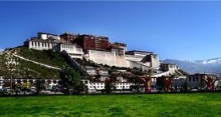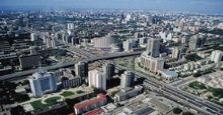ΧβΡΩΡΎ»ί
ΦΌΕ®”Δ”οΩΈ…œάœ Π“Σ«σΆ§Ήά÷°ΦδΫΜΜΜ–όΗΡΉςΈΡΘ§«κΡψ–όΗΡΡψΆ§Ήά–¥ΒΡ“‘œ¬ΉςΈΡΓΘΈΡ÷–Ι≤”–10¥Π”ο―‘¥μΈσΘ§ΟΩΨδ÷–ΉνΕύ”–ΝΫ¥ΠΓΘΟΩ¥Π¥μΈσΫω…φΦΑ“ΜΗωΒΞ¥ ΒΡ‘ωΦ”ΓΔ…Ψ≥ΐΜρ–όΗΡΓΘ
‘ωΦ”ΘΚ‘Ύ»±¥ ¥ΠΦ”“ΜΗω¬©Ή÷ΖϊΚ≈Θ®/\Θ©Θ§≤Δ‘ΎΤδœ¬Οφ–¥≥ωΗΟΦ”ΒΡ¥ ΓΘ
…Ψ≥ΐΘΚΑ―Εύ”ύΒΡ¥ ”Ο–±œΏΘ®\Θ©Μ°ΒτΓΘ
–όΗΡΘΚ‘Ύ¥μΒΡ¥ œ¬Μ°“ΜΚαœΏΘ§≤Δ‘ΎΗΟ¥ œ¬Οφ–¥≥ω–όΗΡΚσΒΡ¥ ΓΘ
ΉΔ“βΘΚ1. ΟΩ¥Π¥μΈσΦΑΤδ–όΗΡΨυΫωœό“Μ¥ ΘΜ
2. ÷Μ‘ –μ–όΗΡ10¥ΠΘ§Εύ’ΏΘ®¥”ΒΎ11¥ΠΤπΘ©≤ΜΦΤΖ÷ΓΘ
Dear Mr Johnson,
IΓ·m writing to tell you that I had a safety journey back to Beijing. Thanks to your kindness, I had a wonderfully time in Australia. It is my first time to go abroad and I was naturally a bit nervous when I was arrived. When I saw you at an airport, I knew from your warm smile that something would be all right. With your help, I visited so many places of interests in Australia, where impressed me a lot. I hope some day you will go to visit Beijing and I will act like a guide to show you around the city.
Yours,
Li Hua
1.safetyΗΡΈΣsafe
2.wonderfullyΗΡΈΣwonderful
3.isΗΡΈΣwas
4.»ΞΒτwas
5.anΗΡΈΣthe
6.somethingΗΡΈΣeverything
7.interestsΗΡΈΣinterest
8.whereΗΡΈΣwhich
9.goΗΡΈΣcome
10.likeΗΡΈΣas
ΓΨΫβΈωΓΩ
1.journeyΘ§Ι ”ΠΫΪsafetyΗΡΈΣsafe.
2.time Θ§Ι ΫΪwonderfullyΗΡΈΣwonderful
3.
4.
5.
6.
7. place/ places of interest.‘ΎΗΟΕΧ”ο÷–placeΈΣΩ… ΐΟϊ¥ Θ§ΕχinterestΈΣ≤ΜΩ… ΐΟϊ¥ Θ§Ι ΫΪinterestsΗΡΈΣinterest.
8.
9.
10. asΘΚ≥δΒ±ΘΜΒΘ»ΈΓ≠Ϋ«…ΪΘ§Ι ΫΪΗΟΨδ÷–ΒΡlikeΗΡΈΣas.
ΩΦΒψΘΚΕΧΈΡΗΡ¥μ

‘ΡΕΝœ¬Ν–≤ΡΝœΘ§¥”ΥυΗχΒΡΝυΗω―ΓœνΘ®AΓΔBΓΔCΓΔDΓΔE ΚΆ FΘ©÷–Θ§―Γ≥ωΖϊΚœΗς–Γ Χβ“Σ
«σΒΡΉνΦ――ΓœνΘ§―Γœν÷–”–“Μœν «Εύ”ύ―ΓœνΓΘ«κ‘Ύ¥πΧβΩ®…œΑ¥ΧβΚ≈56-60ΫΪœύ”Π―ΓœνΉ÷ΡΗΆΩΚΎΓΘ
A |
| City: Lhasa Temperature in July:15-17Γφ Attractions: blue sky, fresh air and wonderful dances |
B |
| City: Harbin Temperature in July: 24-30Γφ Attractions: some old buildings in Russian style |
C |
| City: Chongqing Temperature in July: 28-30Γφ Attractions: tall mountains, hot food and friendly people. |
D |
| City: Hong Kong Temperature in July: 29-30Γφ Attractions: nice and cheap clothes, all kinds of tasty food and chances to find good jobs. |
E |
| City: Guilin Temperature in July: 29-30Γφ Attractions: fantastic hills, clean rivers and many other natural sights. |
F |
| City: Sanya Temperature in July: 27-32Γφ Attractions: exciting water sports, lovely beaches and great tropical fruit. |
«κ‘ΡΕΝ“‘œ¬ΈεΗω»ΥΒΡ–≈œΔΘ§»ΜΚσΈΣΥϊΟ«―Γ‘ώΉν ΚœΒΡ“Μ¥ΠΒΊΖΫΘΚ
1.Joe comes from MoscowΘ®ΡΣΥΙΩΤΘ©. He has studied in Beijing for two years. So he misses his hometown very much. He hopes to go to a city where he can find the feeling of returning home.
2.Mary is an American girl. She likes going shopping. This year sheΓ·ll graduate from a famous Chinese college. So she is planning to travel to a city where she may find a job.
3.Henry is from Canada. He is interested in surfing and diving. But the city in which he is living is far from the sea. So he is expecting to get to a place where he can do these activities and taste bananas and pineapplesΘ®≤Λ¬ήΘ©.
4.Rosa comes from Britain. She cannot stand hot weather. And she thinks some Chinese cities have too much pollution. So she wants to go somewhere clean and peaceful.
5.Timmy comes from Japan. He has great interest in taking photos. He is looking forward to staying close to nature. He even wants to take a boat while taking photos. However, he doesnΓ·t like hot food.





